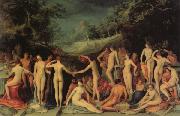Wholesale Oil Painting No Minimum |
|||||||||||
|
|
|||||||||||

|
|||||||||||
|
|
|
||||||||
Karel van ManderDutch Mannerist Writer and Painter, 1548-1606 was a Flemish-born Dutch painter and poet, who is mainly remembered as a biographer of Netherlandish artists. As an artist he played an important role in Northern Mannerism in the Netherlands. He was born of a noble family at Meulebeke in modern West Flanders. He studied under Lucas de Heere at Ghent, and in 1568-1569 under Pieter Vlerick at Kortrijk. The next five years he devoted to the writing of religious plays for which he also painted the scenery. Then followed three years in Rome (1574-1577), where he is said to have been the first to discover the catacombs. On his return journey he passed through Vienna, where, together with the sculptor Hans Mont, he made the triumphal arch for the royal entry of the emperor Rudolph. In 1583 he settled in Haarlem where he lived and worked for 20 years on a commission by the city fathers to inventory "their" art collection; work that he later published in his "Schilder-boeck" (see below). While in Haarlem he continued to paint, concentrating his energy on his favorite genre: historical allegories. In 1603 he retired to the castle of Sevenbergen in Heemskerk to proofread his book that was published in 1604. |
||||||||
|
|
||||||||
Garden of Love
Garden of Love Painting ID:: 28415 |
mk60
Oil on canvas
ttansferred from panel
18x27 1/2"
mk60 Oil on canvas ttansferred from panel 18x27 1/2" |
|||||||
|
|
||||||||
|
Peter Paul Rubens Flemish Baroque Era Painter, 1577-1640 Peter Paul Rubens (June 28, 1577 ?C May 30, 1640) was a prolific seventeenth-century Flemish Baroque painter, and a proponent of an exuberant Baroque style that emphasized movement, color, and sensuality. He is well-known for his Counter-Reformation altarpieces, portraits, landscapes, and history paintings of mythological and allegorical subjects. In addition to running a large studio in Antwerp which produced paintings popular with nobility and art collectors throughout Europe, Rubens was a classically-educated humanist scholar, art collector, and diplomat who was knighted by both Philip IV, king of Spain, and Charles I, king of England. Rubens was a prolific artist. His commissioned works were mostly religious subjects, "history" paintings, which included mythological subjects, and hunt scenes. He painted portraits, especially of friends, and self-portraits, and in later life painted several landscapes. Rubens designed tapestries and prints, as well as his own house. He also oversaw the ephemeral decorations of the Joyous Entry into Antwerp by the Cardinal-Infante Ferdinand in 1635. His drawings are mostly extremely forceful but not detailed; he also made great use of oil sketches as preparatory studies. He was one of the last major artists to make consistent use of wooden panels as a support medium, even for very large works, but he used canvas as well, especially when the work needed to be sent a long distance. For altarpieces he sometimes painted on slate to reduce reflection problems. His fondness of painting full-figured women gave rise to the terms 'Rubensian' or 'Rubenesque' for plus-sized women. The term 'Rubensiaans' is also commonly used in Dutch to denote such women. Garden of Love mk68 Oil on canvas Madrid,Prado c.1630-1632 Netherlands |
||||||||
|
|
||||||||
|
Prev Next
|
||||||||
|
|
||||||||
|
Related Paintings to Peter Paul Rubens :. |
||||||||
|
|
||||||||
|
CONTACT US |

